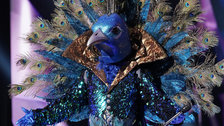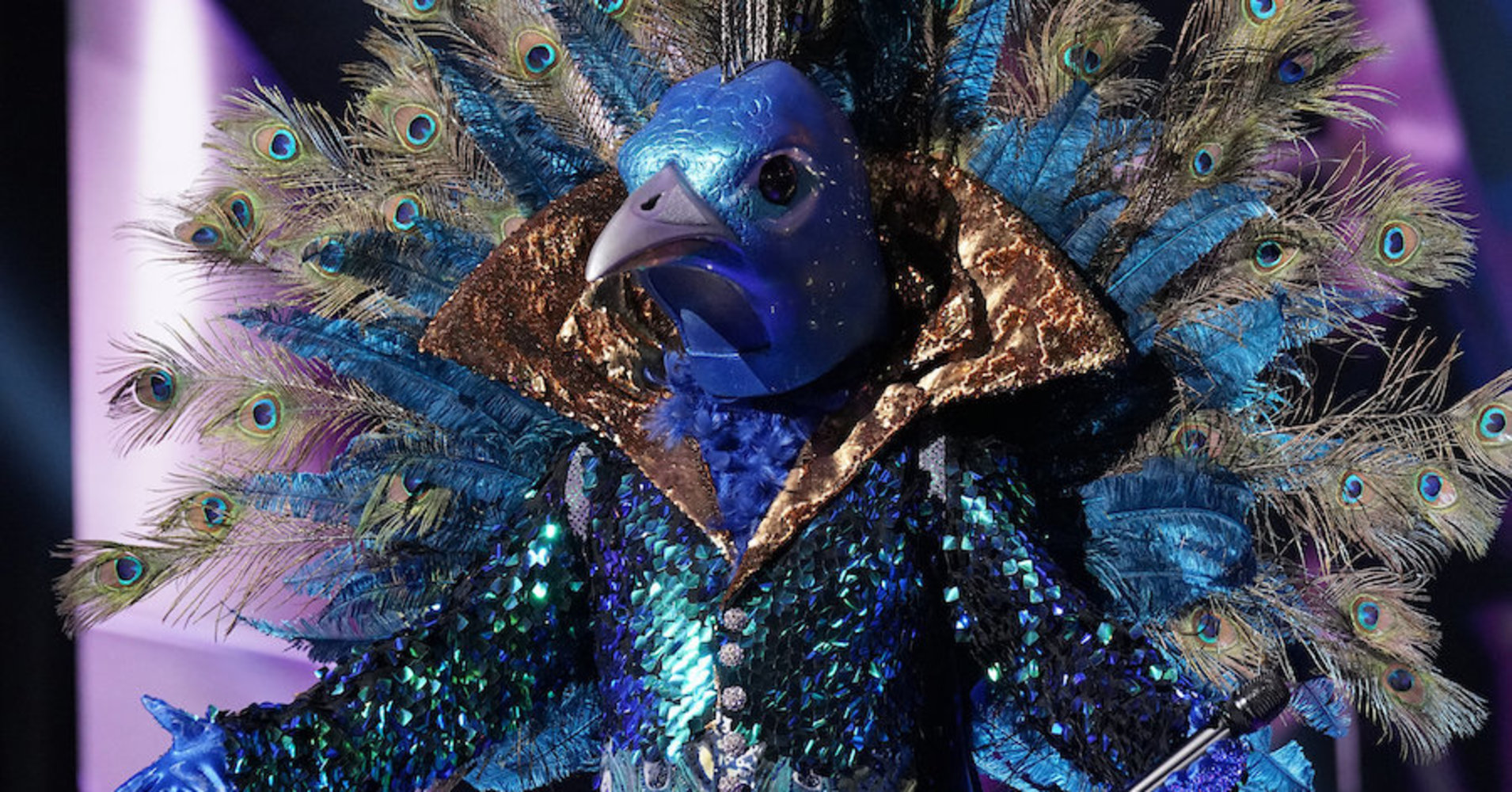[ad_1]

“I’m a monster because that’s what the world labeled me,” a rectangular, fuzzy cyclops laments in the first episode of “The Masked Singer.” Speaking through a voice box so he sounds like a chain-smoking chipmunk, he proceeds: “I was at the top of my game, but the game turned on me. So I retreated to my cave to take a break from the public eye.”
It was the Monster, TV critic after TV critic told me, who first sucked them in to the bizarre television dreamscape that is Fox’s “The Masked Singer.” Many had begrudgingly agreed to watch and review it out of professional obligation, though they initially had little vested interest in a singing competition featuring anonymous celebrities in surreal, full-body disguises. Particularly ones performing under monikers like Alien, Raven and Pineapple.
“It seemed crazy, but sort of crazy in that lovable, old-school Fox way,” Kristen Baldwin of EW recalled. “They love a show with masks. Remember ‘Mr. Personality,’ the dating show hosted by Monica Lewinsky which was essentially ‘The Bachelor’ but with masks?”
(I hadn’t, but after Baldwin mentioned it, I wincingly thought, I probably watched that.)
Baldwin didn’t expect to watch past the first episode of “The Masked Singer.” But after seeing Monster’s introductory package, which prompted judges to wonder whether the phrase “retreating to a cave” was a euphemism for incarceration, Baldwin found herself deep in a Google hole, sifting through musicians who’d served time in prison. Who could the Monster be?
Jezebel’s Rich Juzwiak felt unnerved by the same scene, specifically, he explained, when singer Nicole Scherzinger, one of the show’s judges, moaned “Oh, sweet pea!” in response to Monster’s plight. By the end of the first episode, all the writers I spoke to realized they couldn’t cut the cord just yet.
“Not just out of a sense of professional obligation, either,” Vulture’s Kathryn VanArendonk said. “Out of a sense of ‘what the hell am I watching and will it stay this surreal the whole time?’”
In a time when streaming TV, and the uncensored edginess it permits, reigns supreme, “The Masked Singer” is an unexpected gem in our cultural landscape. Part “American Idol,” part ill-advised trip to Chuck E. Cheese on mushrooms, it’s the kind of nonsensical spectacle that could happen only in 2019, a time when our desire for simple escapism coexists alongside short attention spans and apocalyptic anxieties.
The show is family-friendly in so far as it doesn’t feature any nudity, profanity or violence. “If my son came into the room, I wouldn’t immediately leap for the remote control to change the channel,” Baldwin said.
And yet at the same time, it yields some of the most viscerally haunting imagery I’ve ever encountered on screen. Watching masked celebrities compete for viewers’ applause, hoping against all hope that they’ll live to perform anonymously another day, is akin to falling into a sensory-induced hypnosis.
[It’s] car crash television. … It’s disturbing but you can’t look away.
Kristen Baldwin
“I probably watched it side-eyed the first week or two,” Juzwiak said. “But now I’m completely invested. It is something that is a total pleasure distributor throughout my body.”
It’s perhaps that brain-numbing magic that propelled people to continue watching beyond Monster’s first performance, wondering which ousted singers will be forced to unveil themselves next. (For the uninitiated, only the contestants who fail to garner the favor of a panel of judges and live audience have to take off their masks and reveal their true identity. The rest survive to masquerade for another night.)
“Even when I didn’t really like the show, it forced me into the mystery,” The Los Angeles Times’ Lorraine Ali said, comparing the show to the slew of mystery crime series gaining cult followings on streaming networks. “It has this weird, addictive quality that makes you want to sleuth. It’s like the true crime phenomenon without the dead bodies.”
It’s “car crash television,” as Baldwin put it. “It’s disturbing but you can’t look away.”
Some of the show’s hypnotic qualities are easily explained. First, there are the contestants’ mind-altering costumes, painstakingly created by Emmy-winning designer Marina Toybina. They succeed in transforming sorta-kinda celebrities into otherworldly beasts, the kind you’d encounter if, as Baldwin put it, “you did peyote while watching the Teletubbies.”
In other words, these disguises aren’t just dazzling and over the top; some are also deeply freaky, chilling to the core.
“The masks are horrifying,” Ali said. “The unicorn was supposed to be pretty and dreamy but I thought it looked like a post-apocalyptic angel of death. They are your worst fears.”
“The deer!” Baldwin exclaimed.
“The deer looks like some kind of S&M torture device monster. I just…” she added, before trailing off.
Many of the costumes are disturbing in and of themselves, but perhaps even more darkly beguiling are the ways in which the show’s judges describe the celebrities inside them. Panelists Ken Jeong, Jenny McCarthy, Robin Thicke and Scherzinger are tasked with watching each contestant’s performance, parroting unhelpful remarks about their singing abilities and speculating wildly on who might be hiding underneath each mask. They have also taken it upon themselves to communicate, often, just how hot they think the costumed beings look.
“No one would be on a freaky ass show like this and not get ideas,” guest judge JB Smoove said on a recent episode. Moments earlier, McCarthy called Alien ― later revealed to be La Toya Jackson ― “the hottest thing I’ve ever seen.” On earlier episodes, judges commented on Lion’s “delicious” legs, Unicorn’s “slim” figure and Hippo’s general attractiveness.
No contestant has been as objectified as Alien, who said in her intro package that she’s desperate to be recognized for her voice and not just her physique (in a full-body alien costume, no less). Jeong is the judge who makes his thirst for Alien the most obvious.
“STOP SEXUALIZING THE ALIEN, KEN,” VanArendonk pleaded.
The masks are horrifying. The unicorn was supposed to be pretty and dreamy but I thought it looked like a post-apocalyptic angel of death. They are your worst fears.
Lorraine Ali
Alien is the judges’ favorite thirst trap, but when it comes to critics’ very professional opinions, I found that Peacock and Monster take their respective cakes. “The Peacock has a certain swagger,” Baldwin said. “Although I do also find the Monster very adorable. But if we’re talking straight-up sex appeal, Peacock.”
Juzwiak agrees. “I guess if I had to pick one, it would be the Peacock. So much of what makes a man attractive is the way he carries himself, and Peacock carries himself well.”
(“I want to add that I did not have this thought independent of this interview,” Juzwiak later said as a disclaimer.)
Team Monster consists of Ali and Vox’s Todd VanDerWerff. “I did feel a lot of empathy for the Monster,” Ali said. “I wouldn’t say I want to put a ring on it, but I felt empathy.”
“I do like Monster,” VanDerWerff rejoined. “I don’t know what that says about my constantly evolving sexuality.”
This information failed to shock costume designer Toybina. “Both Peacock and Monster possess such personality and uniqueness,” she said. “I’m not surprised visually they are favored the most.”
Beyond the outfits, the show contains an incredible amount of detail that adds to the general feeling of perplexed attraction. “I’ll watch it once and take notes,” Juzwiak said. “Then I go back and watch again and notice the backup dancers with the weird leotards and masks and crazy dancing.”
Some critics were transfixed by the sight of the live audience, who, out of respect for the contestants trapped uncomfortably within their head-to-toe enclosures, sometimes wear masks themselves. The Ringer’s Miles Surrey finds the crowd’s superfluous energy unsettling.
“I have found a lot of the shots of the live studio audience to be disorienting, and occasionally disturbing,” he said. “I’m not trying to say I wouldn’t have a good time if I was in their situation, just that their collective joy feels a little eerie and artificial. Like they’re too happy to be there. I know I tease this show a lot, but I’m honestly not joking about this.”
“These people are bug-eyed, doubled over laughing,”Juzwiak said. “The whole thing is a bizarre funhouse mirror. Actually, it’s not one funhouse mirror, it’s a bunch with a bunch of different distortions bouncing up against each other. Such a fragmented reality.”
(Juzwiak actually interviewed one particularly peppy “Masked Singer” audience member for a Jezebel story. “She wouldn’t tell me anything,” he said. “She asked me if I was into numerology.”)
Despite their newfound love for “The Masked Singer,” the critics I spoke to did have some sincere criticism of the show. Some took issue with the show’s monotonous competition format and the judges’ inability to keep the mystery alive as the episodes progress. When the dumbfounded panelists, who like to believe Barack Obama or Ruth Bader Ginsburg are slouched inside Toybina’s creations, actually guess correctly the identities of the contestants (e.g., when Jeong correctly predicted the unicorn was Tori Spelling), they’re often light-years behind their audience.
“The setup becomes a bit derivative after a while,” Surrey said, “especially now that the internet has been given so many contestant clues that people have basically figured out the identity of every remaining masked singer.”
To spice things up, VanDerWerff suggested taking a hint from the South Korean series “King of Mask Singer” ― which “The Masked Singer” is based on ― and having contestants battle against one another for a few episodes at a time before being unmasked.
Some critics bemoaned the caliber of talent on the series, expressing a desire to see actual singers instead of injured athletes and stoner comedians. “Everyone on this show is not doing great but they’re still doing,” Juzwiak said.
But others worried raising the bar would tamper with what makes “The Masked Singer” so special: its utter inanity. “I think the show needs more bad singers,” VanDerWerff said. “This show is stupid. They should be more stupid.”
It offers a lot of mirrors to hold up against our culture right now, which can be really stupid.
Lorraine Ali
In the end, everyone agreed. The show is dumb. Wildly, ludicrously dumbity dumb dumb. But it’s also, somehow, producing some of our most weirdly trenchant cultural criticism. There’s something about watching D-list celebrities open up about the ways Hollywood chewed them up and spit them out, made them doubt themselves and their talent. Still they come back for more, even in the most debased circumstances, to feel the warmth of the lights and the love of the crowd. Beneath the garish costumes and incalculable optics, the contestants’ vulnerability feels genuine.
As Tommy Chong put it after being unmasked, “Anything to get on stage.”
“There may be a kernel of truth in ‘The Masked Singer’ about the confounding, alien nature of celebrity,” Surrey hypothesized, “specifically, the difference between a celebrity cultivating an image for themselves and having an authentic self.”
“I think the deep message of ‘The Masked Singer’ is that the answers are never ever as interesting as the questions,” VanArendonk said. “In some sense, it is celebrity image at its purest, unhindered by any dull specifics about who a person really is. It’s all reduced to vague archetype and opaque, dumb hints.”
In the end, however, it’s probably just the otherworldly degree of brainlessness that makes the show so beloved. “It offers a lot of mirrors to hold up against our culture right now, which can be really stupid,” Ali put it.
“I’ve come to a place where I’m like, this is OK,” VanDerWerff said. “This is fine, as the world burns around me.”
[ad_2]
Source link

